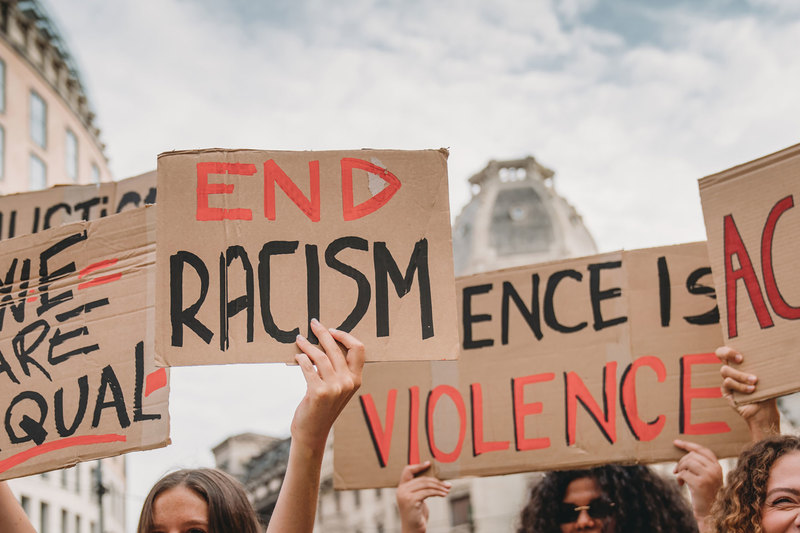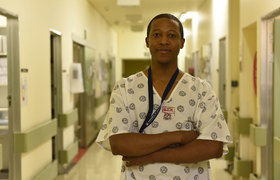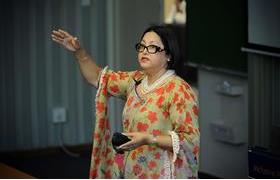Anti-racism policy sparks debate on dignity and harm
04 November 2022 | Story Wendyl Martin. Photo Getty Images. Read time 7 min.
The University of Cape Town’s (UCT) Deputy Vice-Chancellor (DVC) for Transformation, Student Affairs and Social Responsiveness Professor Elelwani Ramugondo hosted an anti-racism online conversation on 24 October, where members of the university community gathered to be enlightened on issues of racism at the institution and beyond.
This comes as the university rolls out an updated anti-racism, racial discrimination and racial harassment policy, approved by the University Council in June 2022.
“The purpose of this policy is to prevent the violation of human dignity and freedom through the imposition of disadvantage, stereotyping, or political or social prejudice ... This policy seeks to eliminate racial harassment and racial discrimination through education and engagement programmes or through disciplinary measures,” reads the new policy’s preamble.
Introducing the anti-racism vision for UCT, Professor Ramugondo spoke of working towards a scholarship on transformation.
“Racism claims real victims, and the ultimate consequence of racism is death.”
“To understand exactly how transformation, excellence and sustainability are intricately linked, we need to build a scholarship on transformation. Given our diversity and complexity as a society [and] still grappling with the legacies of colonisation and apartheid ... What we can build as a scholarship on transformation will necessarily be richly generative and unique,” said Ramugondo.
“We’ve just recently as a university approved our new policy on anti-racism. The debates that we witnessed and participated in as part of the approval process, both in Senate and in Council, made it clear that definitions [linked to racism] matter ... Ultimately, racism claims real victims, and the ultimate consequence of racism is death. Racism and its consequence of death are most brutal and vicious for those who call out oppression and are seen to be obstacles to a system that seeks to demonise and subject marginalised populations to second-class citizenship,” she added.
“You speak well”
Accents and speech patterns are often part of occurring racism, including in classrooms. Invited speaker Professor Adam Haupt, the director of the Centre for Film and Media Studies at UCT, told the audience that accent is often used as a marker of competence.
“In former Model-C schools and in private schools, people continue to be schooled into thinking that a particular kind of linguistic performance in English will signal your competence, the fact that you're not tardy, that you have your act together and that you’re intelligent. That’s where that cliché comes from: ‘You speak so well’, and to this day people still say that to young black people,” said Professor Haupt.
“People’s translingual and multilingual repertoires continue to be read as a deficit, and that impacts upon the way in which learners are assessed in a schooling context and in the university context,” he added.
The second invited speaker, Department of Political Studies lecturer Dr Lwazi Lushaba, said that conversations will help the university community distil its understandings of race and racism.
“The subject of race and racism lends itself into very complex interpretations. In that complexity, we lose the clarity of thought that is necessary to advance at the level of political practice,” said Dr Lushaba.
“It is not enough to understand at an intellectual or conceptual level what race and racism mean if that conceptual understanding does not help us advance the project of making the world that we live in less racial,” he added.
More interventions needed
To combat and curb racism, Lushaba highlighted the importance of considering interventions beyond law and policy.
“Law alone is not enough. It’s necessary, but it’s not enough, and I suspect that we must confront that other part of it: [the question of] what else is necessary; and face ourselves in the eye and say, are we ready for that other part that is necessary. Racism morphs. It adapts itself around whatever law you pass. It will manifest in different ways such that the law will come to be in defence of those ends.”
“Racism morphs. It adapts itself around whatever law you pass.”
Jaamia Galant of the Institutional Planning Department at UCT highlighted that the newly approved policy states that its purpose is to cultivate a university culture through anti-racist teaching and learning practices, research and university operations and through the attendance of training and educational policy sessions on this policy offered and coordinated by UCT’s Office for Inclusivity & Change (OIC) and other university stakeholders. She pointed out that the university needs to ask how it will navigate employment equity policies while creating an anti-racism culture in its education roles.
“[What happens] in a university regulatory context in which we are compelled to continue to report within racial categories which we have inherited from apartheid against which the university does not seem to have any ammunition to push back against? So we are in a space where within employment equity and selection and appointment spaces we are forced to revert to the naming and the prioritising of these categories while at the same time we want to engender a culture of anti-racism through our teaching,” she said.
OIC director, Dr Sianne Alves, suggested that academic freedoms in the classroom must be weighed up against harm when considering the causes and effects of racism.
“In the face of academic freedom there are people being harmed by conceptualisation, by ideology and even by the debate.”
“The policy cannot inform what is taught in the classroom. That would be stepping into debate around academic freedom, which the university is very careful to protect. That is what the OIC is grappling with: in the face of academic freedom there are people being harmed by conceptualisation, by ideology and even by the debate. This is an area that we need to think a bit more carefully about when we’re doing anti-racism education,” said Dr Alves.
Ramugondo highlighted that academic freedom must be understood alongside institutional autonomy and accountability, with the latter pertaining to how UCT, as a public institution, reports on progress, given exclusionary practices that continue as part of its colonial and apartheid legacies.
 This work is licensed under a Creative Commons Attribution-NoDerivatives 4.0 International License.
This work is licensed under a Creative Commons Attribution-NoDerivatives 4.0 International License.
Please view the republishing articles page for more information.










